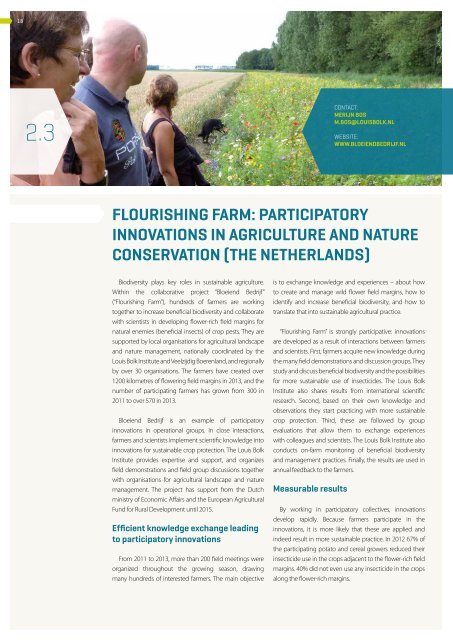tpo_dossier_action-plan-for-innovation-and-learning_201406
tpo_dossier_action-plan-for-innovation-and-learning_201406
tpo_dossier_action-plan-for-innovation-and-learning_201406
Create successful ePaper yourself
Turn your PDF publications into a flip-book with our unique Google optimized e-Paper software.
182.3CONTACT:MERIJN BOSM.BOS@LOUISBOLK.NLWEBSITE:WWW.BLOEIENDBEDRIJF.NLFLOURISHING FARM: PARTICIPATORYINNOVATIONS IN AGRICULTURE AND NATURECONSERVATION (THE NETHERLANDS)Biodiversity plays key roles in sustainable agriculture.Within the collaborative project “Bloeiend Bedrijf”(“Flourishing Farm”), hundreds of farmers are workingtogether to increase beneficial biodiversity <strong>and</strong> collaboratewith scientists in developing flower-rich field margins <strong>for</strong>natural enemies (beneficial insects) of crop pests. They aresupported by local organisations <strong>for</strong> agricultural l<strong>and</strong>scape<strong>and</strong> nature management, nationally coordinated by theLouis Bolk Institute <strong>and</strong> Veelzijdig Boerenl<strong>and</strong>, <strong>and</strong> regionallyby over 30 organisations. The farmers have created over1200 kilometres of flowering field margins in 2013, <strong>and</strong> thenumber of participating farmers has grown from 300 in2011 to over 570 in 2013.Bloeiend Bedrijf is an example of participatory<strong>innovation</strong>s in operational groups. In close inter<strong>action</strong>s,farmers <strong>and</strong> scientists implement scientific knowledge into<strong>innovation</strong>s <strong>for</strong> sustainable crop protection. The Louis BolkInstitute provides expertise <strong>and</strong> support, <strong>and</strong> organizesfield demonstrations <strong>and</strong> field group discussions togetherwith organisations <strong>for</strong> agricultural l<strong>and</strong>scape <strong>and</strong> naturemanagement. The project has support from the Dutchministry of Economic Affairs <strong>and</strong> the European AgriculturalFund <strong>for</strong> Rural Development until 2015.Efficient knowledge exchange leadingto participatory <strong>innovation</strong>sFrom 2011 to 2013, more than 200 field meetings wereorganized throughout the growing season, drawingmany hundreds of interested farmers. The main objectiveis to exchange knowledge <strong>and</strong> experiences – about howto create <strong>and</strong> manage wild flower field margins, how toidentify <strong>and</strong> increase beneficial biodiversity, <strong>and</strong> how totranslate that into sustainable agricultural practice.“Flourishing Farm” is strongly participative: <strong>innovation</strong>sare developed as a result of inter<strong>action</strong>s between farmers<strong>and</strong> scientists. First, farmers acquire new knowledge duringthe many field demonstrations <strong>and</strong> discussion groups. Theystudy <strong>and</strong> discuss beneficial biodiversity <strong>and</strong> the possibilities<strong>for</strong> more sustainable use of insecticides. The Louis BolkInstitute also shares results from international scientificresearch. Second, based on their own knowledge <strong>and</strong>observations they start practicing with more sustainablecrop protection. Third, these are followed by groupevaluations that allow them to exchange experienceswith colleagues <strong>and</strong> scientists. The Louis Bolk Institute alsoconducts on-farm monitoring of beneficial biodiversity<strong>and</strong> management practices. Finally, the results are used inannual feedback to the farmers.Measurable resultsBy working in participatory collectives, <strong>innovation</strong>sdevelop rapidly. Because farmers participate in the<strong>innovation</strong>s, it is more likely that these are applied <strong>and</strong>indeed result in more sustainable practice. In 2012 67% ofthe participating potato <strong>and</strong> cereal growers reduced theirinsecticide use in the crops adjacent to the flower-rich fieldmargins. 40% did not even use any insecticide in the cropsalong the flower-rich margins.


